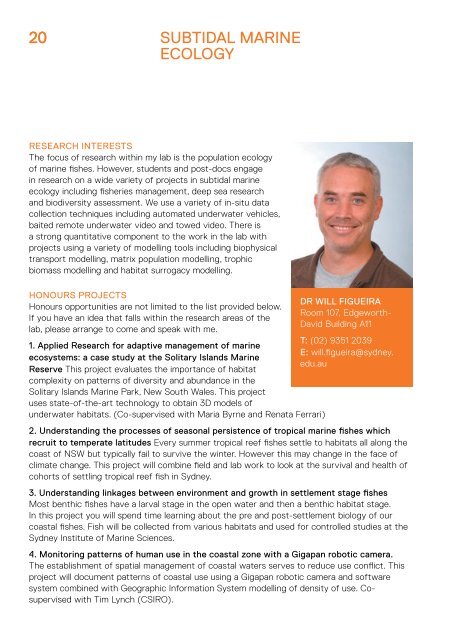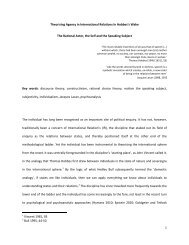biological sciences HONOURs 2014 - The University of Sydney
biological sciences HONOURs 2014 - The University of Sydney
biological sciences HONOURs 2014 - The University of Sydney
You also want an ePaper? Increase the reach of your titles
YUMPU automatically turns print PDFs into web optimized ePapers that Google loves.
20<br />
SUBTIDAL MARINE<br />
ECOLOGY<br />
Research Interests<br />
<strong>The</strong> focus <strong>of</strong> research within my lab is the population ecology<br />
<strong>of</strong> marine fishes. However, students and post-docs engage<br />
in research on a wide variety <strong>of</strong> projects in subtidal marine<br />
ecology including fisheries management, deep sea research<br />
and biodiversity assessment. We use a variety <strong>of</strong> in-situ data<br />
collection techniques including automated underwater vehicles,<br />
baited remote underwater video and towed video. <strong>The</strong>re is<br />
a strong quantitative component to the work in the lab with<br />
projects using a variety <strong>of</strong> modelling tools including biophysical<br />
transport modelling, matrix population modelling, trophic<br />
biomass modelling and habitat surrogacy modelling.<br />
Honours projects<br />
Honours opportunities are not limited to the list provided below.<br />
If you have an idea that falls within the research areas <strong>of</strong> the<br />
lab, please arrange to come and speak with me.<br />
1. Applied Research for adaptive management <strong>of</strong> marine<br />
ecosystems: a case study at the Solitary Islands Marine<br />
Reserve This project evaluates the importance <strong>of</strong> habitat<br />
complexity on patterns <strong>of</strong> diversity and abundance in the<br />
Solitary Islands Marine Park, New South Wales. This project<br />
uses state-<strong>of</strong>-the-art technology to obtain 3D models <strong>of</strong><br />
underwater habitats. (Co-supervised with Maria Byrne and Renata Ferrari)<br />
Dr Will Figueira<br />
Room 107, Edgeworth-<br />
David Building A11<br />
T: (02) 9351 2039<br />
E: will.figueira@sydney.<br />
edu.au<br />
2. Understanding the processes <strong>of</strong> seasonal persistence <strong>of</strong> tropical marine fishes which<br />
recruit to temperate latitudes Every summer tropical reef fishes settle to habitats all along the<br />
coast <strong>of</strong> NSW but typically fail to survive the winter. However this may change in the face <strong>of</strong><br />
climate change. This project will combine field and lab work to look at the survival and health <strong>of</strong><br />
cohorts <strong>of</strong> settling tropical reef fish in <strong>Sydney</strong>.<br />
3. Understanding linkages between environment and growth in settlement stage fishes<br />
Most benthic fishes have a larval stage in the open water and then a benthic habitat stage.<br />
In this project you will spend time learning about the pre and post-settlement biology <strong>of</strong> our<br />
coastal fishes. Fish will be collected from various habitats and used for controlled studies at the<br />
<strong>Sydney</strong> Institute <strong>of</strong> Marine Sciences.<br />
4. Monitoring patterns <strong>of</strong> human use in the coastal zone with a Gigapan robotic camera.<br />
<strong>The</strong> establishment <strong>of</strong> spatial management <strong>of</strong> coastal waters serves to reduce use conflict. This<br />
project will document patterns <strong>of</strong> coastal use using a Gigapan robotic camera and s<strong>of</strong>tware<br />
system combined with Geographic Information System modelling <strong>of</strong> density <strong>of</strong> use. Cosupervised<br />
with Tim Lynch (CSIRO).
















